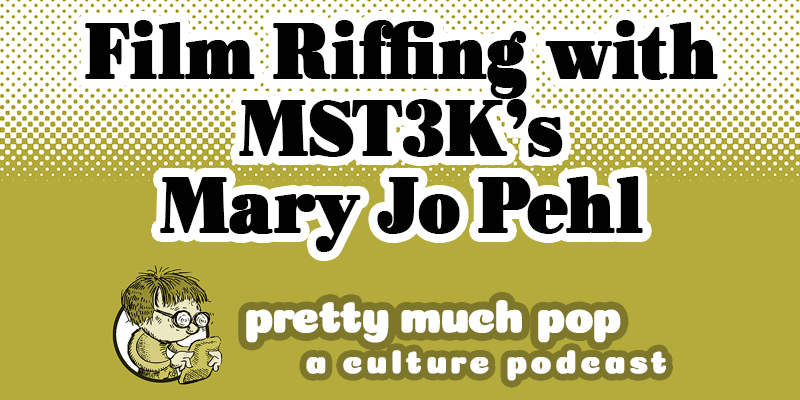
We live in a commentary culture with much appreciation for camp and snark, but something special happened in the early '90s when Mystery Science Theater 3000 popularized this additive form of comedy, where jokes are made during a full-length or short film. Mary Jo Pehl was a writer and performer on MST3K and has since riffed with fellow MST3K alums for Rifftrax and Cinematic Titanic.
Mark, Erica, and Brian briefly debate the ethics of talking over someone else's art and then interview Mary Jo about how riffs get written, developing a riffing style and a character that the audience can connect with (do you need to include skits to establish a premise for why riffing is happening?), riffing films you love vs. old garbage, the degree to which riffing has gone beyond just MST3K-associated comedians, VH-1's Pop-Up Video, and more.
Follow Mary Jo @MaryJoPehl.
Here are a some links to get you watching riffing:
- For MST3K newbies, you might want to watch some episodes, nearly all of which are on YouTube. The AV Club has recommended its top ten episodes. Mark thinks a great introduction to the show (from a late season that features Mary Jo as a regular cast member) is S10E03 riffing a rare contemporary film, 1996's Merlin's Shop of Mystical Wonders. For a classic (i.e. featuring original host and creator Joel Hodgson) episode, S03E03's Pod People is much beloved.
- Watch samples of Bridget and Mary Jo riffing the blockbuster Gravity, Mary Jo with Rifftrax founder (and former MST3K host) Mike Nelson riffing Mariah Carey's Glitter, the two of them doing a full short at a Rifftrax Live event, and with Cinematic Titanic Live taking on Rattlers.
Different teams have different styles of riffing, so if you hate MST3K, you might want to see if you just hate those guys or hate the art form as a whole. The alums themselves currently work as:
- Rifftrax (Mike Nelson, Kevin Murphy, and Bill Corbett, who were the stars of the final MST3K seasons, but the new effort involves different writers. They riff both old B-movies and Hollywood blockbusters like Twilight.
- Rifftrax Presents includes Bridget and Mary Jo (who among other things, are able to effectively treat shorts and films that aim to discuss "women's issues") as well as the very British Matthew J. Elliot and Ian Potter, Janet Varney and Cole Stratton, and Rifftrax writers Conor Lastowka and Sean Thomason.
- Joel Hodgson owns MST3K and recently did his final tour as a riffer, though that entirely new group will continue performing without him and just issued the Live Social Distancing Riff-Along Special. Joel led from behind the scenes the recent Netflix MST3K revival with host Jonah Rey.
- Frank Coniff and Trace Beaulieu (who participated with Mary Jo and Joel in Cinematic Titanic) tour as "The Mads," which doesn't seem to have any clips posted, but you can hear their podcast Movie Sign with the Mads.
- Groups influenced by MST3K that Mark checked out include Master Pancake Theater, Rangoon Riffs, The Guy with Glasses, Linkara, Snob Riffs, and The Last Angry Geek. Rifftrax allows groups like these to create and sell their own riffs.
Here are a few relevant articles:
- "'Mystery Science Theater 3000' at 30: How a Cult TV Show Changed Pop Culture" by Noel Murray
- "Color Commentary" by Tad Friend
- "'Mystery Science Theater 3000' Returns with New Blood for the Turkey Day Marathon" by Meredith Woerner
Also, PROJECT: RIFF is the website/database we talk about where a guy named Andrew figured out how many riffs per minute are in each MST3K episode, which character made the joke, and other stuff.
Learn more at prettymuchpop.com. This episode includes bonus discussion that you can only hear by supporting the podcast at patreon.com/prettymuchpop. This podcast is part of the Partially Examined Life podcast network.
Pretty Much Pop: A Culture Podcast is the first podcast curated by Open Culture. Browse all Pretty Much Pop posts or start with the first episode.
Is It Rude to Talk Over a Film? MST3K’s Mary Jo Pehl on Pretty Much Pop: A Culture Podcast #45 is a post from: Open Culture. Follow us on Facebook, Twitter, and Google Plus, or get our Daily Email. And don't miss our big collections of Free Online Courses, Free Online Movies, Free eBooks, Free Audio Books, Free Foreign Language Lessons, and MOOCs.
from Open Culture https://ift.tt/2AkDDRB
via Ilumina
Comments
Post a Comment